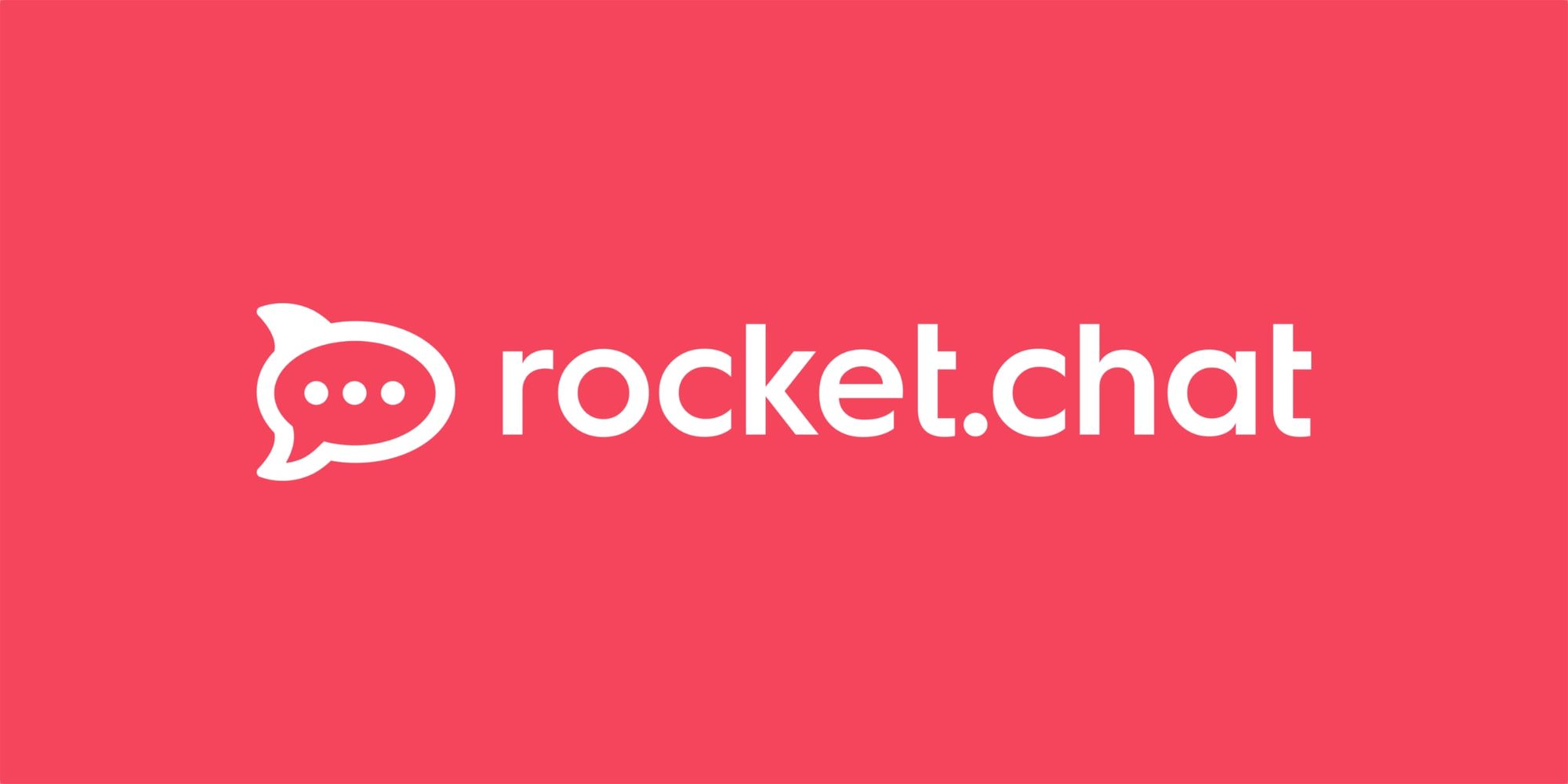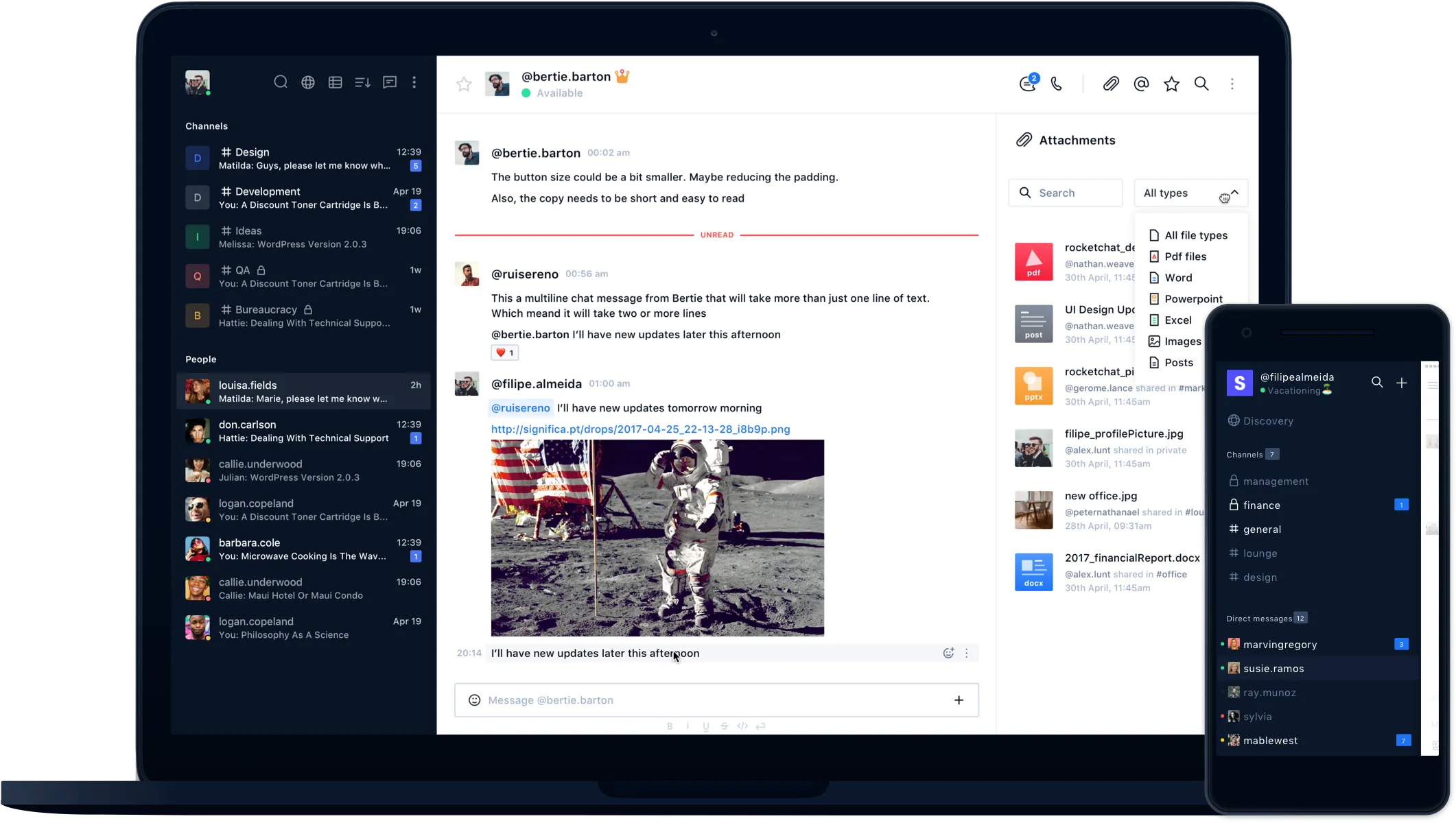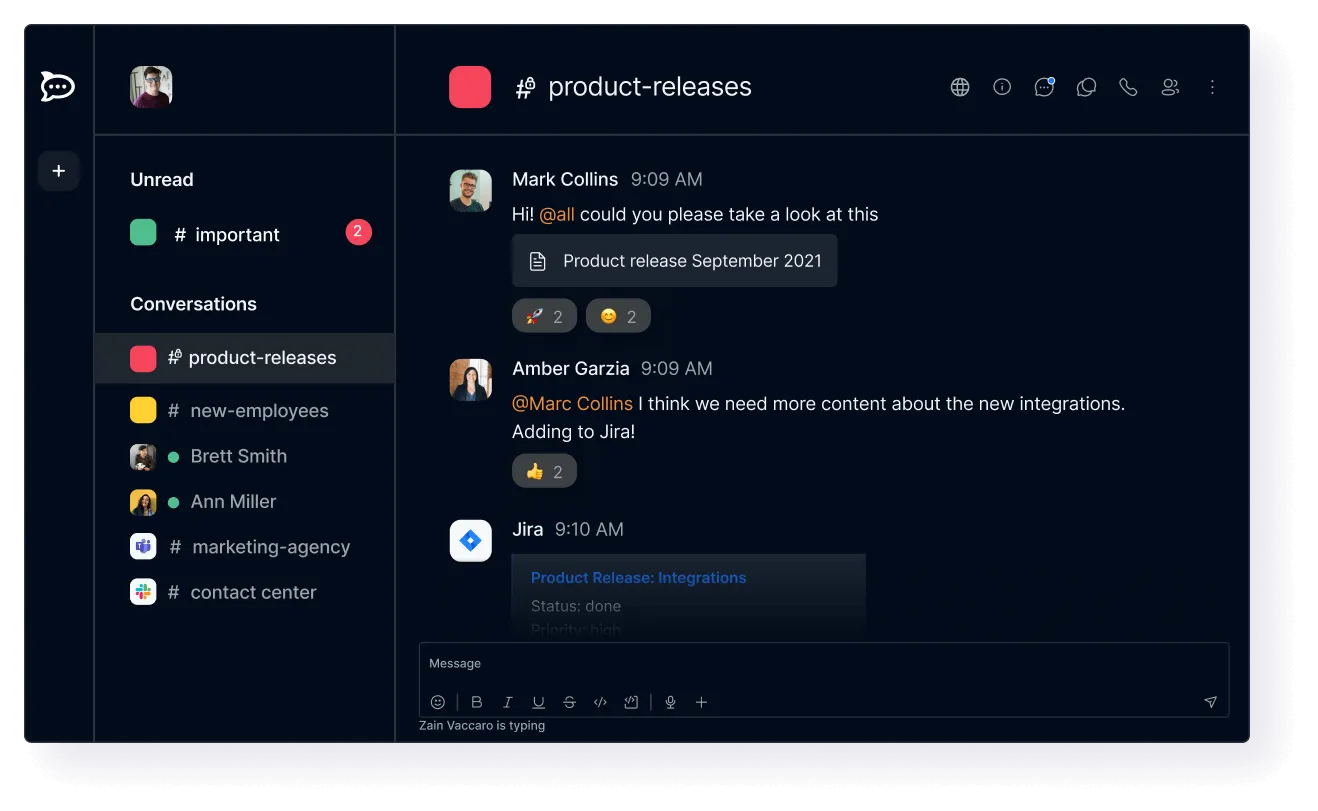Deploy Rocket.Chat [Updated Feb '26]
Rocket Chat [Feb '26] (Chat Platform, Slack & Teams alternative) Self Host
Rocket.Chat
Just deployed
MongoDB
Just deployed
/data/db

Deploy and Host Managed Rocket Chat with one click on Railway
Rocket Chat is a free, open-source communication and collaboration platform available on GitHub, designed as a powerful Slack alternative for teams and enterprises. With Rocket.Chat, you gain complete control over your chat, video, and team collaboration experience while keeping your data secure. The Rocket Chat community is large and active, providing continuous updates and support.
About Hosting Rocket.Chat on Railway (Self Hosting Rocket Chat Docker on Railway)
You can self host Rocket Chat using Docker to have full control over your messaging, video calls, and integrations without relying on third-party providers. With Rocket Chat Docker deployment, you ensure your data stays private and configurations are entirely under your control. Hosting Rocket Chat on Railway makes the deploy process extremely simple with containerized services, automated scaling, and secure environments.
Railway allows you to spin up Rocket Chat instantly, without worrying about server setup, dependencies, or operating system administration. Instead of configuring everything manually, you can launch Rocket Chat in just one click with Railway’s managed infrastructure.
Why Deploy Managed Rocket Chat Service on Railway
Deploying Rocket.Chat as a managed service on Railway gives you effortless setup, built-in scaling, and automated updates. It combines the flexibility of Rocket Chat Docker with the convenience of Railway’s fully managed platform.
Railway vs DigitalOcean
While DigitalOcean requires manual server setup, Rocket Chat installation, and ongoing patching, Railway enables instant Rocket Chat deploy with Docker containers, eliminating sysadmin overhead.
Railway vs Linode
Linode involves detailed manual configurations for Rocket Chat install, SSL setup, and database provisioning. Railway automates these steps, running Rocket.Chat in secure Docker containers with a friendly interface.
Railway vs Vultr
With Vultr, you must manage backups, environment setup, and custom tuning for Rocket Chat hosting. Railway removes this hassle by automating deployments, offering faster startup, and ensuring resilience.
Railway vs AWS Lightsail
AWS Lightsail adds networking and scaling complexity for self hosting Rocket Chat. Railway abstracts these tasks away, making Rocket.Chat deploy as seamless as a few clicks.

Common Use Cases for Rocket Chat
Here are 5 popular use cases for Rocket.Chat:
- Team Communication Hub – Replace Slack with Rocket.Chat for team channels, direct messages, and file sharing.
- Customer Support – Use Rocket Chat for live chat on your website, helping customers in real time.
- Community Management – Host your own community channels without relying on Discord or external platforms.
- Secure Collaboration – Ideal for enterprises needing full control over messaging and video communication.
- Integration with DevOps Tools – Connect GitHub, Jira, and CI/CD pipelines directly into Rocket.Chat for notifications and updates.
Dependencies for Rocket.Chat Hosted on Railway
To host Rocket Chat via Docker, the following dependencies are typically needed:
- MongoDB (backend database)
- Node.js runtime
- Docker & Docker Compose for containerized deployment
- Reverse Proxy (Traefik or Nginx) for SSL and routing
Deployment Dependencies for Managed Rocket Chat Service
When you use Railway, these are automatically provisioned and managed:
- Secure MongoDB instance
- Managed Docker containers
- Built-in scaling and monitoring
- SSL certificates
Implementation Details for Rocket Chat (Messaging Platform)
When deploying Rocket Chat Docker containers, you’ll configure environment variables like:
MONGO_URLROOT_URLPORTADMIN_EMAIL
These ensure Rocket.Chat connects with your database and runs smoothly on Railway.
How Rocket Chat Compares to Other Collaboration Platforms
Rocket Chat vs Slack
Slack is cloud-hosted with proprietary data storage, while Rocket.Chat is open-source and can be fully self-hosted with Docker. Rocket.Chat offers more flexibility and control at a lower cost.
Rocket Chat vs Microsoft Teams
Teams integrates tightly with Microsoft 365 but is closed-source. Rocket.Chat offers open-source customization, Docker deployments, and integration with any third-party tools.
Rocket Chat vs Discord
Discord is great for casual communities but not privacy-focused. Rocket.Chat, on the other hand, gives enterprises control and compliance with on-premise or Docker hosting.
Rocket Chat vs Mattermost
Mattermost and Rocket.Chat are both open-source. Rocket.Chat focuses more on multi-channel support (chat + voice + video), while Mattermost is chat-first.
Rocket Chat vs Zulip
Zulip’s thread-based model is unique but less intuitive for casual users. Rocket.Chat provides a more Slack-like experience with extensive plugin and integration support.
How to Use Rocket.Chat
- Deploy Rocket Chat using Docker or Railway’s one-click deploy.
- Configure your Rocket Chat login details and create admin accounts.
- Invite your team or community members.
- Create channels, direct message groups, and integrate bots.
- Access via Rocket Chat download (desktop & mobile apps) or web.
How to Self Host Rocket.Chat on Other VPS Providers
Clone the Repository
Download Rocket Chat from GitHub: Rocket Chat GitHub
Install Dependencies
Make sure your VPS has Docker, Docker Compose, Node.js, and MongoDB installed.
Configure Environment Variables
Set required variables like MONGO_URL, ROOT_URL, and PORT.
Start Rocket Chat Docker Containers
Use docker-compose up -d to run Rocket.Chat and its dependencies.
Access the Rocket.Chat Dashboard
Go to your VPS public URL, log in, and start collaborating.
With Railway, you skip these steps and deploy Rocket Chat instantly with a single click.

Features of Rocket.Chat
- Open-source and customizable communication platform
- Real-time chat with channels, groups, and direct messaging
- Integrated video conferencing
- File sharing and screen sharing
- Secure and compliant with GDPR, HIPAA, and enterprise standards
- Large integration ecosystem (GitHub, Jira, Zapier, etc.)
- Multi-platform access: web, mobile, and desktop apps
Official Pricing of Rocket Chat Cloud Service
Rocket.Chat offers both free self-hosted options and paid cloud services. Pricing starts with a free community edition for self hosting. The cloud-hosted plans begin at around $7 USD per user per month, offering advanced features, support, and compliance. Enterprise plans are also available for larger organizations. [Updated Oct ’25]
Self Hosting Rocket Chat vs Paid Cloud Plans
- Self Hosting Rocket.Chat Docker: Free, full control over infrastructure, complete customization.
- Rocket.Chat Cloud Plans: Paid, fully managed hosting with premium features, SLAs, and priority support.
Monthly Cost of Self Hosting Rocket Chat on Railway
Self hosting Rocket Chat Docker on Railway generally costs $5–$15 USD per month for the base app instance, plus additional charges for MongoDB and storage depending on team size.
System Requirements for Rocket.Chat
- CPU: 2+ cores
- RAM: 2GB minimum (4GB recommended)
- Storage: 20GB+
- MongoDB 4.x
- Node.js LTS version
FAQs
What is Rocket Chat?
Rocket Chat is an open-source communication platform that offers team messaging, video conferencing, and integrations, available via GitHub.
How do I self host Rocket Chat using Docker?
You can self host by deploying Rocket Chat Docker containers, configuring MongoDB, and setting environment variables like ROOT_URL and MONGO_URL.
What are the key features of Rocket Chat?
Features include team chat, video calls, file sharing, integrations with GitHub, Jira, and more, plus enterprise-grade security.
How do I deploy Rocket Chat on Railway?
With Railway, you can deploy Rocket Chat Docker containers instantly using their one-click template, skipping manual setup.
What are the dependencies for Rocket Chat hosting?
Rocket Chat requires MongoDB, Node.js, and Docker/Docker Compose for hosting.
What are the common use cases for Rocket Chat?
It’s used as a Slack alternative, for customer support chat, secure enterprise communication, and DevOps tool integration.
How does Rocket Chat deployment on Railway compare to other VPS providers?
Railway automates the deployment with Docker, scaling, and monitoring, while other VPS providers require manual configurations.
What is the difference between self hosting Rocket Chat and Rocket Chat cloud plans?
Self hosting is free and customizable, while cloud plans are paid, fully managed, and come with enterprise support.
How much does it cost to self host Rocket Chat on Railway?
Around $5–$15 USD per month, plus MongoDB and storage costs, making it more affordable than many SaaS chat alternatives.
Where can I find the official Rocket Chat source code?
You can find the project on [Rocket Chat GitHub](https://github.com/RocketChat/Rocket Chat).
Template Content
Rocket.Chat
rocket.chat:latestMongoDB
mongo